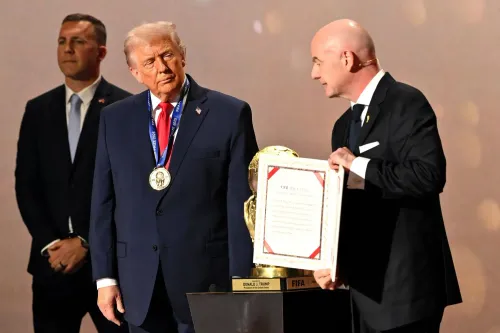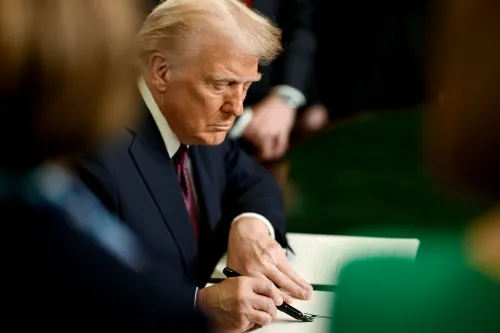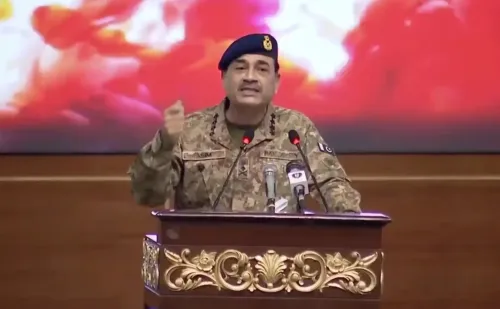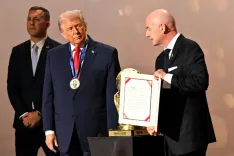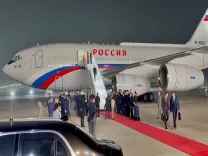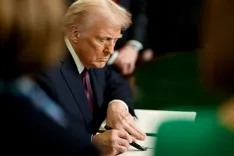Has Turkey Under Erdogan Become Hostile to India?

Synopsis
Key Takeaways
- Turkey's transformation under Erdogan highlights a shift towards Islamist populism.
- Media manipulation plays a crucial role in shaping narratives against India.
- Cultural erosion is a significant concern due to the influence of hardline ideologies.
- Military cooperation between Turkey and Pakistan poses challenges for India.
- Geopolitical dynamics in South Asia are evolving, affecting regional stability.
New Delhi: Under the leadership of President Recep Tayyip Erdogan, Turkey has experienced a significant shift from a relatively secular, pro-Western democracy to a nation gravitating towards Islamist populism. A key factor in this transformation is Erdogan's strategic manipulation of the media on both domestic and international stages.
Experts have expressed worries that Erdogan's administration has transcended mere domestic press control, instead adopting a calculated strategy of exporting its ideological stance globally. State-run media outlets in Turkey, which once employed Western journalists, are now increasingly hiring Pakistani professionals with strong ideological biases.
Currently, almost half of the editorial staff at these media outlets comprises Pakistani nationals, many of whom are linked to hardline ideologies and have shown support for separatist movements in South Asia. Turkish media now actively promotes narratives that align with Islamabad while expressing anti-India sentiments.
Observers of foreign policy contend that the integration of Pakistani journalists into Turkish media is not merely a reflection of Ankara-Islamabad camaraderie; it may be an orchestrated initiative by Pakistan’s intelligence agency, the ISI, aiming to elevate Pakistani geopolitical interests, counter Indian narratives, and leverage Turkish soft power as a platform for radical Islam.
A tragic outcome of this media radicalization is the cultural deterioration within Turkey itself. Historically characterized by Sufi traditions, Turkish Islam was once celebrated for its pluralism and syncretism. However, with the rise of Pakistani-Deobandi interpretations of Islam, promoted by the new wave of Pakistani journalists and clerics, there is growing concern regarding the erosion of Turkey's spiritual heritage.
This ideological transition is being propelled not only through newsrooms but also via Turkey’s expanding religious institutions. The Diyanet or DIB, Turkey's influential Presidency of Religious Affairs, has seen a remarkable increase in both power and budget, actively promoting a curriculum that aligns more closely with political Islam.
The Pahalgam attack, resulting in the deaths of 26 Indian Hindus, triggered 'Operation Sindoor' and marked a significant escalation in the India-Pakistan conflict. Turkey's military, diplomatic, and media support for Pakistan has exacerbated tensions.
President Erdogan met with Pakistan's Prime Minister Shehbaz Sharif just hours after the Pahalgam attack, which was carried out by The Resistance Front (TRF), an extension of the Pakistan-based Lashkar-e-Taiba (LeT). Following the attack, the Pakistani Army pledged 'unwavering support' to such terrorist groups concerning Kashmir.
Post Operation Sindoor, Erdogan publicly condemned India's air strikes, reaffirming solidarity with Pakistan during a conversation with Sharif.
Following the Pahalgam incident, pro-Pakistani Turkish media echoed the absurd claim made by Pakistani Defence Minister Khwaja Asif to Al-Jazeera, asserting that the massacre was a 'false flag operation' orchestrated by India.
As Pakistan launched attacks on Indian civilian areas using 300-400 Asisguard Songar quadrotor UCAVs and Bayraktar Yiha-III drones on May 8-9, targeting several Indian cities, Turkish media continued to support Pakistan's narrative.
In sync, Turkish media outlets began to repeat Pakistan's assertions, dismissing its role in the Pahalgam attack, characterizing Operation Sindoor as 'unprovoked aggression' and referring to Kashmir as 'Indian-administered.'
Debris from drones intercepted by Indian air defenses confirmed their Turkish origin.
'A forensic examination of the drone debris is currently underway. Preliminary findings suggest that the drones are Turkish-made Asisguard Songar models,' Colonel Sofiya Qureshi and Wing Commander Vyomika Singh stated during a press briefing on May 8.
Pakistan employed civilian flights as shields to launch Turkish Songar drones, a cowardly tactic that India exposed. Drone swarms targeted Indian civilian and military locations but were neutralized by India's robust air defenses.
Earlier, six Turkish C-130 Hercules military transport aircraft, likely carrying an arms shipment, arrived at Karachi airport on April 27 and May 2. Additionally, a Turkish warship, the TCG Buyukada (F-512), part of the Ada-class ASW corvettes of the Turkish Navy, also docked in Karachi.
However, Turkey claimed these stops were routine for 'routine refueling' and that the Hercules was not transporting arms. This assertion appears to be false, as Pakistan is currently experiencing a shortage of arms and ammunition after selling a significant stock to Ukraine a few months ago. The drone capabilities used by Pakistan on May 9-10 would not have been feasible without Turkey's drone supplies. Essentially, Turkey has emerged as the second-largest arms supplier to Pakistan.
It's noteworthy that Turkish President Erdogan’s younger daughter Sumeyye Erdogan is married to defense industrialist Selçuk Bayraktar. Baykar Technology, the company run by Selçuk Bayraktar, his father Ozdemir Bayraktar, and his two brothers, has been developing Unmanned Aerial Vehicles (UAVs), including Bayraktar drones, for both the Turkish military and other countries, including Pakistan.
The Bayraktar TB2 drones are medium-altitude long-endurance UCAVs capable of remote-controlled or autonomous flight operations. These have been extensively utilized by Ukraine in the ongoing conflict with Russia. In 2020, during the conflict between Azerbaijan and Armenia over the Nagorno-Karabakh enclave, Azerbaijan's President Ilham Aliyev used the TB2 to target vehicles and troops, subsequently displaying footage of the strikes on digital billboards in Baku. Bangladesh and Pakistan have also deployed these drones along their borders with India.
Significantly, the Turkish intelligence chief visited Pakistan on April 30 to assure full support against India. A high-level delegation led by Lieutenant General Yasar Kadioglu, Chief of Intelligence, Turkish General Staff, met with Pakistan's Air Chief Marshal Zaheer Ahmed Baber Sidhu, Chief of the Air Staff, Pakistan Air Force (PAF), during his visit to the Air Headquarters in Islamabad. Their meeting occurred amid escalating tensions along the India-Pakistan border.
Pakistan's Prime Minister Shehbaz Sharif also met with Turkish Ambassador Irfan Neziroglu on May 13, expressing gratitude to Turkey for its support during the conflict with India.
Under Erdogan, Turkey-Pakistan relations have evolved into a structured military collaboration, encompassing defense production, training, joint operations, and strategic alignment.
Turkey and Pakistan increasingly view themselves as part of a larger Islamic geopolitical bloc, often positioning themselves in opposition to traditional Middle Eastern power centers such as Sunni Saudi Arabia and the UAE. Erdogan’s aspiration to lead the Muslim ummah aligns seamlessly with Pakistan's longstanding ambition for leadership in the Islamic world.
Turkey's actions follow China’s recent military assistance to Pakistan, including drone supplies. Collectively, these actions illustrate a concerted strategic initiative. Analysts suggest that the China-Turkey-Pakistan triangle has emerged as a counterbalance to India's regional influence.
Turkey's support for Pakistan further destabilizes an already-fragile South Asia. When a NATO member aligns with a nation accused of harboring UN-designated terrorists, it transcends being a regional threat; it presents a potential challenge to collective security.
Ankara’s embrace of Islamabad is not merely symbolic, as Turkey increasingly resonates with Pakistan’s narrative on global platforms.
(The writer is an expert on South Asia and Eurasia. He previously worked with the Manohar Parrikar Institute for Defence Studies and Analyses. The views expressed are personal.)


